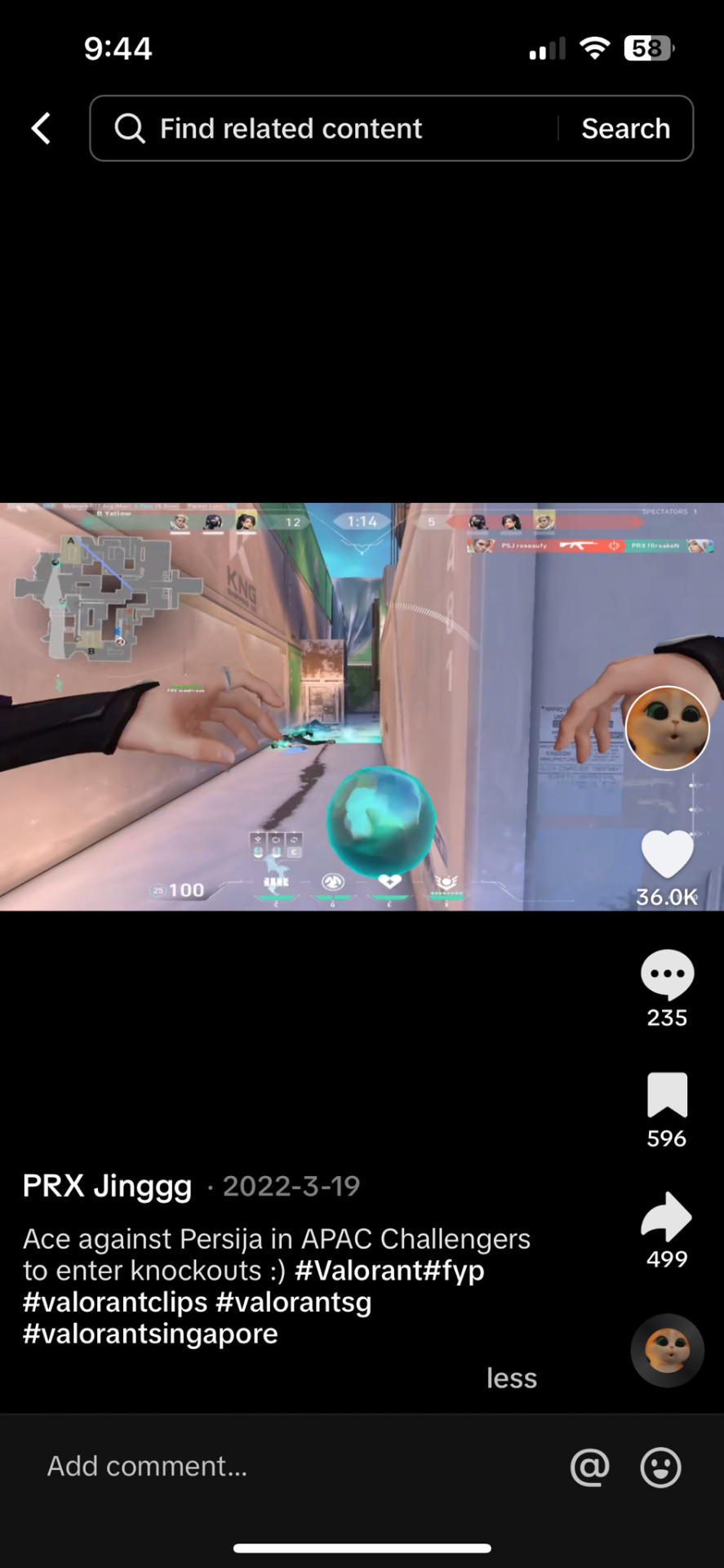Don't wanna be here? Send us removal request.
Text
TEXT 7



My last and final text is taken from Facebook, which is a platform that I know is very very popular still in Singapore but I don't personally use. Therefore, it took a while before I finally came across a post that my friend shared onto my feed that provided a glimpse into Singaporean Facebook.
The original post from the page called Heritage SG Memories seems to serve a phatic function by using an old picture of the local bookstore Popular to spark a conversation among the community. The caption also serves as a stimulus for this discussion, "the place that u will go when weather is hot". The omission of the preposition "to" in this sentence emulates the grammar of Singlish when spoken verbally.
The second top comment by Sky Wong tags their friend Hariesh to get Hariesh to look at the picture. This is the same as in Text 4 when I explained how tagging someone has evolved beyond a marker to indicate a conversation thread, but a communication tool to "send" a post to somebody else. In the case of Facebook, the @ symbol will disappear once the tag has inserted, and the name of the person tagged will be shown in bold letters instead.
The use of emoji in these comments suggest to me a crowd that is older than Gen Z as in most of these comments, the emoji choices seem less creative and dissimilar to what Gen Z might use. Take San Santo Rex's comment for example, they share a funny anecdote and then follow it with "laughing with tears" emoji, "pleading eyes" emoji and "sunglasses" emoji. The latter two are not very relevant to the topic of the comment or discussion, but seem more like the type of emoji an older person might randomly choose. A quick Google search revealed to me that as of 2023, about 75% of Singaporean users on Facebook are older than Gen Z. Furthermore, by nature of the field of this discussion being nostalgia for the 90s, it can be safe to assume that most if not all of these commenters who are sharing their own anecdotes of the time are well older than Gen Z.
Another element of CMC that I notice in this is the use of reactions to comments. Granted that this feature is not given as an option to users on Reddit, Instagram, etc. within the comment section, so it would be unfair to say that users from these platforms would not also use them given the chance. On Facebook however, users can "react" to comments using emojis such as the "thumbs up" emoji to represent liking, the "laughing" emoji to represent humour, etc. In this screenshot it seems that the "like" is the most favoured since it is the default reaction on Facebook. This is a form of non-verbal CMC that Facebook users have become accustomed to for expressing their support toward another person's post or comment.
0 notes
Text
TEXT 6

Text 6 is a recent food review taken from an Instagram Food Blog written by one of my good friends. His blog is decently popular among Singaporean "foodies" (a subculture of people who are enthusiastic about trying and eating different foods). I personally attribute this success to his style of writing which incorporates online language and elements of Singaporean speech with the traditional persuasive "voice" of food reviews and advertisements.
ONLINE-ISMS
emojis: fire emoji, drooling emoji. These are thoughtfully chosen and serve a complementary function to suit the text they are written with (e.g. melt in your mouth -> drooling emoji). The creativity and intention behind the usage of emoji suggests that the author is a young person (I can confirm that he is). "rly" "ur": shortenings of "really", "your"
SINGAPOREAN-ISMS
"Really mai tu liao": blending Hokkien dialect into English (meaning: don't wait any longer) "jelak": Malay word for the feeling of being overwhelmed or bored with something after doing it too many times, commonly incorporated into English/Singlish sentences by Singaporeans "ah": Singlish particle "u won't regret it one!": emulates the natural speaking manner in Singlish; the "one" here is used in Singlish to represent the Chinese particle "的". "If still not full, then how?": more Singlish grammar "shiok": from the Malay slang "syiok", expressing satisfaction and pleasure
FOOD REVIEW-ISMS
Beginning with the price, name and location of the food
Persuasive commentary that describes the flavour and experience, and why the reader should try this food
"We recommend:" "Main gripe:" "Overall:" providing pros & cons, ratings, etc.
I think that most successful food bloggers make use of the online-isms and food review-isms that I've mentioned in order to make their content more engaging and persuasive. What I think makes my friend's blog successful and well-received by his audience is that he incorporates many Singaporean-isms into his writing. Since he is posting his reviews on Instagram instead of a dedicated web page or food-specific website, his writing needs to feel familiar and relatable to local Singaporean audiences in order to keep them engaged with his blog and compel them to try the different foods. Using elements of Singlish and Singaporean speech makes his review seem less like a paid advertisement for a restaurant and more like a glowing recommendation from a local friend, which is what I believe has attracted many in the Singaporean Instagram Foodie community to him.
0 notes
Text
TEXT 5



Text 5 is yet another post taken from a Singaporean Reddit page, but instead of r/Singapore which is the "official" community, this is taken from r/SingaporeRaw, which is a community created by users who split off from r/Singapore because they felt that the moderators of that page were abusing their powers by censoring and banning anyone who said something controversial or unpopular. While r/SingaporeRaw was created as a subversion of r/Singapore to let such users express their "raw" and unfiltered (possibly controversial) opinions, its regular users have also begun using the page as a general community chat for social/phatic function.
See this example where u/cd-t posts a meme about chicken-less chicken rice after Singaporean news outlets reported a halt in the import of chickens from Malaysia. Posts and comments in r/Singapore (see Text 3) which tend to be more formal and/or serious due to strict moderation, hence posts such as Text 3 share official links to news article and people generally use standard English even when cracking jokes. In this text, you can see that r/SingaporeRaw truly attempts to be "raw" and informal, and u/cd-t posts a meme with a title fittingly written in Singlish.
The entire post, comments included, is full of Singlish-isms in that the way the commenters speak online closely simulates spoken Singlish.
"Why no veg?": Direct translation of "Why are there no vegetables?" (standard English) but written in the syntax of Chinese and omitting grammatical words. 为什么 (why) 没有 (lacking/no) 菜 (veg/vegetables)?.
"op ask no cucumber" op: popular online abbreviation for Original Poster, in this case referring to u/cd-t ask no cucumber: more Singlish grammar, where the tense (ask/asked) is ignored and the preposition "for" is omitted. "leh" & "lor": Singlish particles
"Auntie why no egg leh?": A perfect combination of the last three elements I mentioned (syntax, grammar, particles used). The usage of "Auntie" is also a direct manifestation of the commenter's Singaporean-ness, as it stems from the Singaporean culture of people addressing older women as Auntie regardless of whether they are family. In this case, it also reflects a stereotype or assumption that many stingy hawker food sellers are "Auntie"s.
Just like the other texts, online language and stylistic choices can also be seen in these comments.
"ngl": abbreviation for "not going [to] lie"/"not gonna lie"
"XD": a laughing emoticon
"Lmao": abbreviation for "laughing my *ss off"
I would say that at least in my own experience, you are more likely to find 'just-for-fun' memes and posts in r/SingaporeRaw than in r/Singapore, where you are more likely to see serious debate and discussion surrounding the news and current affairs in Singapore. (This is not to imply that r/Singapore does not also have its fair share of memes and lightheartedness, but just to say that it may have proportionately less). r/SingaporeRaw's raw and unfiltered nature is perhaps why the language used in the post, title and comments are also less formal, more Singlish, and more Online.
0 notes
Text
TEXT 4


Text 4 is a series of comments screenshotted from latest post of my favourite Singaporean eSports player.
Something I wanted to narrow in on as a CMC feature is the use of "@" to tag another user, but not as part of a reply.
In class we learnt about users of synchronous online chats (such as IRC) using certain symbols to indicate a specific person they are talking to. In 1996, users on IRC would reply to each other using a colon (:) or a dash (-).

In this example above, Alvin uses a colon to indicate that he is speaking to bubi, and Shaquille uses a dash to indicate he is speaking to Alvin. As social media became more sophisticated, the @ symbol would later be able to directly link to the tagged person, often sending them a notification that they had been tagged. For example, replying to a comment under an Instagram post would begin with @[XX], with XX being the username of the person you are replying to. Similar function can be seen on other platforms where synchronous interaction can happen such as Telegram, Facebook comments, Twitter threads, etc.
TikTok videos and comments are asynchronous, and for someone to watch a video they must either seek it out by scrolling through their feed or specifically searching it up within the search function. In these comments, user Ahnafwiraa uses the "@" symbol to tag 3 of their friends in a comment, which sends them a notification and a link to watch this video. They are not replying to another comment that any of the 3 friends have made, but instead using the @ as a tool to initiate an interaction.
This demonstrates how in the 2020s, "tagging" people has evolved and is not only used for indicating the direction of a message in an existing conversation, but has extended to a new means by which one could "show a video or send a "send" a message to others (as opposed to Ahnafwiraa downloading the video or copying the link and sending it to the 3 friends via another messenger).
0 notes
Text
TEXT 3


Text 3 is a reddit post and its top comments that I came across from r/Singapore, a community of Singaporean redditors (reddit users).
The subject of this post is IKEA Singapore's recent cutting of prices for some of its products, and the purpose of the post is to start a discussion on how r/Singapore users feel about this change.
CODE SWITCHING
Something I found interesting about this post was the way that the top commenter, heartofgold48, changes his linguistic style to fit in with the person who he responds to. The original post (top screenshot) simply provides the link and title to the news article about IKEA, written in standard English and a short joke in the caption from the poster ClaytonWest74 which reads "can IKEA run our government instead?". heartofgold48's initial comment, which was voted as the top comment, is another joke that plays off the humour of ClaytonWest74's joke. It reads "Even the IKEA cabinet is better than our expensive world class cabinet", a pun in jest of Singapore's government. This comment is also written in standard English.
However, user Personal-Shallot1014 responds to heartofgold48 with a comment that makes use of both Singlish, Textese, and some other feature of online language.
"Cannot say like that leh": Singlish grammar. Standard English would say: "You shouldn't say that". The use of "leh" is also a particle seen from Singlish speakers.
"cuz": derived from "'cause", derived from "because". This is a shortening of the word "because" that is commonly seen in texting and online language.
In response to Personal-Shallot1014's comment, heartofgold48 responds with a comment using the Singlish particles "hor" (Ya hor = meaning, "oh, yeah!") and "woh" (confirmation, agreement) that matches the Singlish used by Shallot. To me, this is an example of how Singaporeans engage in code-switching and incorporate elements of Singlish into our online language in order to connect and relate to other Singaporeans online.
TONE INDICATORS
"/s": The use of a slash at the end of a sentence followed by a letter or string of letters, when seen in the context of an online post such as this, is meant to be an indicator of the author's tone. The name for this type of labelling is literally called a 'tone indicator'.
In this instance, both Personal-Shallot1014 and heartofgold48 use /s, which refers to sarcasm, indicating that their comments are meant to be interpreted as sarcastic.
I believe that while tone indicators have existed for a long time, they have become particularly prevalent on the internet since 2020, when a majority of people were forced to stay indoors due to Covid-19 and began spending more of their time in online spaces. This is also around the time when Gen Z, on platforms such as TikTok, began discussing social matters such as ableism, accessibility and acceptance for neuro-divergent people (people on the autism spectrum, ADHD, etc.). Tone indicators became more common around that time as a means of accessibility for neuro-divergent people who may struggle with picking up nuances such as tone and intent through text-based communication. Some other common indicators include /neg (negative), /srs (serious), or /j (joking). Usage of tone indicators is not mandatory in most online spaces including Reddit, but Personal-Shallot1014 and heartofgold48's usage of /s suggests that they spend a fair amount of time online, enough that it would be a familiar concept to them.
0 notes
Text
TEXT 2

This text exchange is taken from a conversation between two Malaysian-Singaporeans, who are both adults and gamers.
We can observe the mixture of Malay, Manglish/Singlish, Mandarin, and English being used in this exchange where A invites B to play a game.
"jom": Malay, meaning 'lets' (i.e. 'let's game')
"meh" "ma" "ah": Particles from Manglish/Singlish speak
"dah cakap kan": Malay, meaning 'I already told you'
"lai": Mandarin, romanised version of 来, meaning 'come'
There is also evidence of Textese in the form of shortened and abbreviated words such as:
"tmr": tomorrow
"u": you
"ph": public holiday
"lol": laugh out loud
This text is a good example of a casual exchange where the purpose is A making a bid to B to play a game together. As this exchange happens online through Discord's text messaging function, both parties use online language to speak and respond to each other.
Although this exchange occurs in the same group-chat as Text 1, Text 2 is a private exchange between 2 parties only as A directly addresses B and invites B only to play. The codeswitching is thus a result of both parties familiarity with each other and knowing that due to their similar backgrounds as Malaysian-Singaporeans, they can use any or all of their shared languages between themselves.
0 notes
Text
TEXT 1

Text 1 is taken from a group chat on Discord consisting of 3 members - A, B and C. All three parties are from Singapore or Malaysia, and live and work in Singapore. This is evidenced by the use of Singlish/Manglish spellings and grammar.
"haven": meaning 'haven't'. This spelling of 'haven't' attempts to simulate the spoken pronunciation ('haven') of English in a Malaysian or Singaporean accent.
"Why all haven't awake yet" is a question posed in Singlish/Manglish grammar by A, asking why B and C have not woken up yet. Other examples of Singlish/Manglish grammar are "waiting mummy" and "we haircut together" which do not follow the syntax and grammar rules of standard English (Waiting for my mummy; We are getting haircuts together) but instead mimic Mandarin syntax by omitting certain conjunctions and prepositions such as "for", "my", etc.
等 (wait) 妈妈 (mother) = literal translation: wait mother > waiting mummy
我们 (we) 一起 (together) 剪头发 (getting haircut) = literal translation: we together getting haircut > we haircut together
下午 (evening) 5+ 才 (then) 回 (back) 吧 (particle) = evening 5+ then back ba; meaning "I will be back in the evening around 5pm"
"ba" used by B is the romanisation of the Chinese word 吧 which is a particle that could indicate agreement, emphasis or in this case, confirmation.
The use of "hehe" by B also signals a higher likelihood that B is female, which is confirmed by A who uses the feminine pronoun "she" in reference to B.
"Jiu balik": A combination of Hokkien dialect "招" (jio/jiu/chio) meaning 'invite', and Malay "balik" meaning 'back'/'return', to mean that A will re-invite B and C after returning from the gym. This invitation is to play online games together, which is corroborated by other elements in the text such as references to "unfriended" and "haven online" (not yet online), as well as the nickname "noobnoob" given to B which is derived from the word "noob" in online gamer language. A reader could make the inference that the three parties are friends who play online games together frequently. The frequency may be assumed based upon the lack of explicit mentioning of games from A, yet B and C understand that the "jiu" (invite) refers to an invitation to play.
0 notes